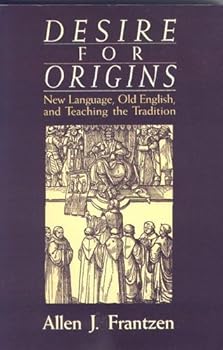Desire for Origins: New Languages, Old English, and Teaching and Tradition
Select Format
Select Condition 
Book Overview
To many folks, the study of Old English language and literature may seem dull, moribund, rarefied, and largely irrelevant-- a subject only of concern to concern only to musty old academics in the ivory tower. Frantzen doesn't (directly) try to argue against this perception-- instead, he tries to investigate *why* this perception exists. His answer is an insightful and eye-opening investigation into the relationship among scholarship, ideology, and...
Format:Paperback
Language:English
ISBN:0813515912
ISBN13:9780813515915
Release Date:November 1990
Publisher:Rutgers University Press
Length:260 Pages
Weight:1.00 lbs.
Dimensions:0.8" x 6.1" x 9.0"
Customer Reviews
1 rating
Brilliant insights into the ideology of a scholarly field
Published by Thriftbooks.com User , 23 years ago
To many folks, the study of Old English language and literature may seem dull, moribund, rarefied, and largely irrelevant-- a subject only of concern to concern only to musty old academics in the ivory tower. Frantzen doesn't (directly) try to argue against this perception-- instead, he tries to investigate *why* this perception exists. His answer is an insightful and eye-opening investigation into the relationship among scholarship, ideology, and cultural relevance.Frantzen begins by providing a brief history of Old English (aka Anglo-Saxon) scholarship from its origins in the 16th century to the present day. From the beginning, he observes, the study of Old English and of texts written in it has been motivated by ideological (i.e. political) concerns. It began in the 16th century as part of a conscious effort to find medieval evidence for the existence of an independent English Church prior to the Norman Conquest, as a way of finding historical grounds for justifying the English Reformation. During the 17th and 18th centuries, the study of Anglo-Saxon texts took on a slightly different political agenda, as political theoriests and speechmakers (on both sides of the Atlantic-- Thomas Jefferson was, in fact, a quite knowledgeable amateur scholar of Anglo-Saxon) sought to make claims about precedent, legitimacy, and the rights of the 'free-born Englishman' being rooted in the earliest origins of English, and by extension, Anglo-Saxon, political culture. In the 19th century, the study of Anglo-Saxon became connected to a kind of nationalism that saw the Anglo-Saxon past as a kind of childhood of the modern English nation. This nationalism was sometimes (but not always) connected to a historico-racial view of nationality and identity, which suggested that anyone of English ancestry ought to revere Anglo-Saxon and its literary monuments, as they were the creations of their great forefathers. In all these cases, a desire to discover, posit, or identify in the Anglo-Saxon past some sort of origins (religious, political, linguistic, ancestral, etc.) that were of current ideological concern provided a powerful motivating force for the study of Anglo-Saxon and made Anglo-Saxon scholarship seem relevant.Then we turn to the 20th century.... and more particularly to its last few decades. According to Frantzen, the main reason Anglo-Saxon scholarship today is a bit musty is become detached from these big political contraversies. The reason is that it is perceived as esoteric and irrelevant, Frantzen suggests, is that in many ways, it genuinely has become so from an ideological point of view. People no longer study Anglo Saxon because they are concerned with establishing on a firm foundation, the history of the English Church, or in debating whether there is medieval precedent for radical constitutional changes in England or America, or out of a firm belief that our own origins as a people and a nation (whoever "we" actually are) can be found among th





